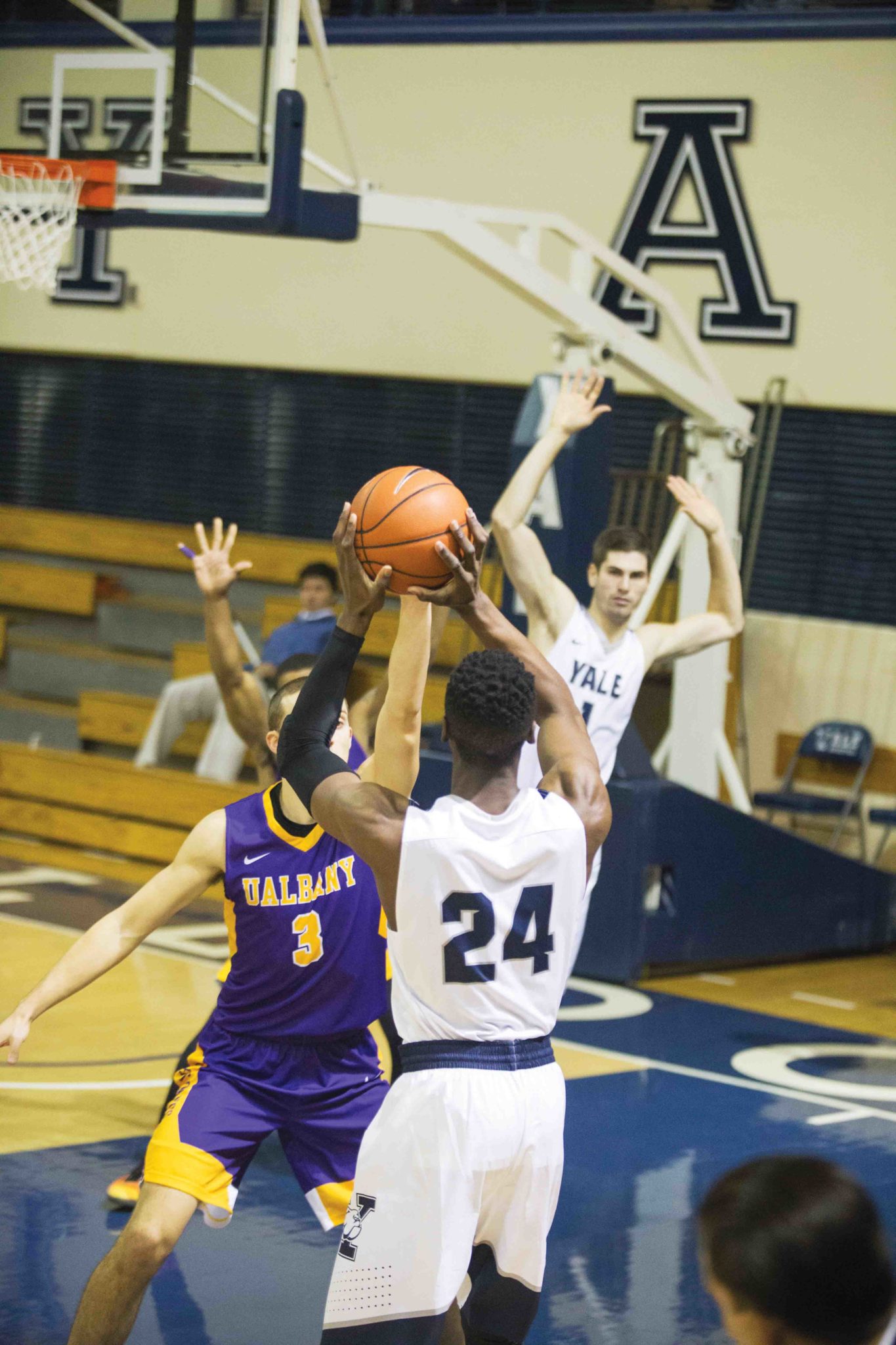
The Yale men’s basketball team entered the 2016–17 season knowing it had some big shoes to fill: forwards Justin Sears ’16 and Brandon Sherrod ’16 as well as guard Nick Victor ’16 each graduated and began professional careers in Europe.
Then point guard and postseason hero Makai Mason ’18 suffered a foot injury that would prevent him from suiting up all season.
A season removed from a campaign in which his six-man freshman class played a combined 110 minutes through the first seven games, head coach James Jones has turned to his rookies to help replace the production of four All-Ivy starters.
Jones and his Eli (3–4, 0–0 Ivy) squad have adopted a “next man up” mentality. While captain and guard Anthony Dallier ’17 and forward Sam Downey ’17 bring experience to the team in 2016–17, Yale asked its younger players to step up as well. Thus far, members of the highly touted freshman class and several sophomores have all played critical roles for the Bulldogs.
“We’re in a situation where we graduated a lot [of players] last year and there’s more opportunity,” Jones said. “We’ve only had about 30 practices. [The freshmen] make a lot of mistakes because of that youth so they have to grow up fast … but they have the right mindset.”
Yale expected to have Mason, a first-team All-Ivy selection and the team’s leading scorer from last year, bringing the ball up the floor this season, but his injury has tested the Bulldogs’ resilience and depth. In addition to Mason’s absence, the Bulldogs face an even tougher rebuilding task in replacing its trio of senior starters. Sears, Sherrod and Victor scored 46.9 percent of the team’s points last year and grabbed 64 percent of its rebounds.
Sears, Yale’s most seasoned starter of the bunch, averaged 15.7 points and 7.5 rebounds per game during his senior campaign en route to his second consecutive Ivy League Player of the Year honor as well as a pair of honorable mentions for the All-American team. Sherrod, Sears’ counterpart on the low block, tallied 12.7 points per game while Victor added 7.2 rebounds per contest from the wing.
The former earned first-team All-Ivy honors last season alongside Sears and Mason, while the latter earned an honorable mention.
The Bulldog youth has stepped up admirably to fill this rebounding void. Guard Miye Oni ’20 leads Yale with 7.4 rebounds per game as a guard, just 0.1 under Sears’ average last year. Yale’s other two leading rebounders thus far are forwards Jordan Bruner ’20 and Blake Reynolds ’19, who have brought down 7.3 and 5.6 boards per contest, respectively.
As the lone freshman starting for the Bulldogs, Oni has impressed in almost every facet of the game. The Porter Ranch, California, native is just averaging 12.7 points per game — as good a mark as Sherrod’s from his senior season — and started his collegiate career with a 24-point debut against Washington.
“You can tell from game one to now, and from when we started practice to now, that [the freshmen] made some great strides,” Dallier said. “To a large extent, we needed them to step up. We don’t have as many upperclassmen on the team this year.”
Guard Trey Phills ’19 and Reynolds round out the youthful starting lineup. Phills saw sparse minutes last year in the Big Dance, but has further improved his play this season. In addition to flashing his offense in triple his minutes per game over last year, Phills has been one of Yale’s best on-ball defenders as a sophomore.
In the frontcourt, Reynolds has been a serious scoring threat in every game so far. Though Reynolds, like Phills, played a supporting role as a freshman, the Jackson, Missouri native is third on the team in points and rebounds in 2016–17. The 6-foot-7 big man has been instrumental in spreading the floor for Yale, converting on 45.2 percent of his 31 three-point attempts with one of the quickest shot releases on the team.
Despite not yet recording a start of his own, guard Alex Copeland ’19 has also established himself as key cog in the Bulldogs’ young machine. The sophomore has played nearly 25 minutes per game off the bench this season and ranks second on the team with 12.7 points per game as a threat attacking the basket and from range.
“We all come here as ‘the guy’ in high school,” Copeland said. “When I came in I just remember being hungry. All these guys have taken their opportunity and run with it. They’re not afraid. They’re working on their game in practice and since they’ve gotten here they’ve been confident, and I think that’s huge.”
Bruner missed the first four games of the season due to a knee injury, but in his recent return to the rotation has already shown the potential, which made him Yale’s most highly anticipated recruit in recent history. In limited minutes, the 6-foot-9 forward has been a huge presence inside, with over seven rebounds and 2.0 blocks per game.
While forward Austin Williams ’20 and guard Eric Monroe ’20 have played smaller roles so far this season, the pair of freshmen have still earned their minutes and left their marks, even at crucial times. Williams scored two important baskets in the second half of Yale’s overtime victory against Lehigh on Nov. 17, and also dropped eight points last Wednesday against Bryant.
Monroe has also energized the backcourt and shot well from deep in his four appearances. The guard’s 10 minutes logged in Saturday’s win bring the Bulldog freshmen tally to 364 on the season, more than three times the total time put in by last year’s freshmen through as many games.
The Bulldogs will look to put this youth to good use on Thursday as they travel to Sacred Heart to face a 3–5 Pioneer team.







